Hardwood Flooring Pros and Cons
March 1, 2024 | By Bruce Product Expert
Hardwood Flooring Continues to be Popular
According to the National Wood Flooring Association (NWFA), 52 percent of homeowners have wood flooring. Another two-thirds of homeowners said they would choose hardwood floors in wood flooring in their dream homes.
So, hardwood flooring is quite popular. Even so, hardwood flooring has its pros and cons.
Let’s examine the good and bad of hardwood flooring.
Hardwood Flooring Addresses What Homeowners Value Most
In that same survey by NWFA, homeowners cited three critical factors when selecting flooring
1. Durability (67%)
2. Attractiveness (61%)
3. Easy to Clean (58%)
When considering those factors, hardwood flooring ranks either first or second. The other flooring types tested in the survey were carpet, tile, laminate, and vinyl.
Wood flooring topped all flooring types for attractiveness at 68%, compared to tile, its nearest competitor, at 46%. And it ranked just behind tile for durability and ease of cleaning.
It also far outpaces other flooring types concerning adding value to a home. Sixty-six percent of those surveyed rated wood flooring as excellent. That easily topped tile at 39%, laminate at 18%, and carpeting at 17%.
Hardwood flooring has a lot going for it. But let’s take a look closer at its pros and cons.
The Pros of Hardwood Flooring
Unlike most flooring types, hardwood can last a lifetime. So, that’s a great starting point when considering its advantages.
Hardwood Floors Are Durable
Hardwood flooring can last a century with proper maintenance. It’s common to see homes from the 19th and even 18th centuries with solid hardwood floors intact. So, installing hardwood in your home can easily last the entirety of your life.
Other flooring options like vinyl and laminate need to be replaced, in best cases, every 25-30 years. But one of the beauties of hardwood flooring is that you can refinish it multiple times.
And depending on the floor’s thickness, you can do so as many as four to six times. Professional installers recommend refinishing solid wood floors every seven to 10 years.
Today, much of the wood flooring comes prefinished. Those finishes typically use aluminum oxide, which adds to the flooring’s durability. It helps avoid scratches to keep your hardwoods looking great longer.
You can learn more about prefinished hardwood vs. unfinished wood flooring here.
You Can Select from Numerous Species and Colors
There’s no getting around it – hardwood floors look incredible. It’s not surprising that new homeowners often tear up carpeting to expose the wood flooring underneath.
Moreover, wood flooring offers countless options regarding species and colors. Oak flooring has long been the favorite among consumers. But you can select from any number of hardwoods:
• Maple
• Hickory
• Birch
• Tigerwood
• Teak
• Mahogany
The list goes on. In addition, hardwood flooring like hickory changes its appearance from plank to plank. So, your flooring takes on the additional character of its graining and coloration.
Hardwood Floors Are Easy to Care For
Wood floors require little care. Just remove surface debris with regular sweeping or vacuuming. You’ll also want to clean up spills quickly to avoid water damage, one of hardwood flooring’s cons.
Otherwise, you can use a dedicated hardwood flooring cleaner like Bruce. Just spray and mop your floors, preferably with a microfiber mop.
You can also use polish several times a year. Generally, polishes include a urethane finish that adds shine to your wood floors while helping protect against scratches.
Learn more about cleaning and protecting wood floors here.
Hardwood Floors Are A Plus for Allergy Sufferers
It may not occur to you, but hardwood floors provide better hygiene than other floors, especially carpeting. For example, carpeting traps allergens and pathogens. And that makes it difficult for those with respiratory issues.
Equally important, carpeting traps odors. So, if you have pets, your carpets will often have an unpleasant smell, particularly if your pets have occasional accidents.
Not so with hardwood flooring. Wood floors are non-electromagnetic, meaning they don’t tend to attract too much debris or dirt. As a result, nasty particles don’t get trapped in your flooring as with carpeting.
Another advantage of hardwood is that it improves your indoor air quality. For instance, the Environmental Protection Agency (EPA) says hardwood flooring is one of the best options. It improves indoor air quality because it’s hypoallergenic.
Wood Flooring Is a Sustainable Option
Wood flooring presents a sustainable flooring option. Each year, carpeting, vinyl, and other manufactured products generate waste in landfills. More importantly, that waste is often non-biodegradable.
Hardwood floors are made from a natural product – trees. And even though we harvest them to produce wood flooring, we’re replacing them. The forestry community planted 2.3 billion seedlings last year.
Equally important, hardwood flooring has numerous other sustainable features:
Wood flooring is carbon neutral.
Owing to its longevity, hardwood flooring requires less replacement than other types like vinyl, laminate, or carpeting.
Wood floors are reusable.
Hardwood Floors Add Value to Your Home
As mentioned above, wood floors add value to your home.
According to Money, hardwood floors add 3 to 5% value to your home. The average return on investment (ROI) for installing hardwood floors is 70% to 80% (realtor.com).
The Cons of Hardwood Flooring
As you can see, hardwood flooring has a lot going for it. But nothing is perfect. So, let’s discuss some of its negatives.
Hardwoods Are Typically More Expensive Than Other Flooring Options
Hardwood flooring may be outside your cost range. Typically, it’s more expensive than carpeting, laminate, vinyl, and tile. And, unless you’re a DIY type, installation costs add to your bottom line.
Many homeowners choose wood-look flooring options like laminate flooring or luxury vinyl plank. Generally, they cost much less than hardwood flooring. Plus, with today’s manufacturing processes, they look surprisingly authentic.
For instance, Bruce offers LifeSeal™ rigid core vinyl flooring. It mimics the look of wood while adding waterproofing and scratch resistance.
The counter to any cost objection is that hardwoods, as mentioned, add value to your home. So, you need to consider it a long-term investment with an ROI.
Water and Wood Don’t Mix Well
Hardwood flooring’s biggest Achilles heel is water. It can withstand some water but not large amounts. That’s even more true if the water sits on the flooring for any time.
Water damages wood floors in two ways. First, it can cause the floor’s boards to warp and cup.
Second, water can seep between the plank’s seams, which can cause cupping and lead to mold concerns on your subflooring.
Third, you might encounter termite damage.
Even humidity can impact your hardwood flooring by causing crowning. Crowning occurs when the center of the wood plank becomes higher than its edges. So, you’ll want to pay attention to your home’s temperature and humidity.
Hardwood floors should only be used in dryer locations like living rooms and bedrooms. However, you can install engineered hardwood. It’s more water-resistant than solid hardwood. As a result, you have better flexibility with its installation.
Fortunately, flooring manufacturers like Bruce eliminate moisture concerns with waterproof hardwood floors like Hydropel. This engineered hardwood flooring uses six water protection dimensions.
Some Hardwood Floors Scratch Easily
It’s a simple fact – you’ll encounter scratches if you own hardwood floors. That’s particularly true in high-traffic areas or if you have active kids or pets. Vinyl flooring options, on the other hand, are less prone to scratches.
Prefinished hardwood floors help reduce scratches. In addition, harder woods like hickory, oak, and maple help resist scratching. But eventually, both will show scratches.
If scratches are a concern, keep a touch-up pen to cover them. You can also use area rugs in areas with high foot traffic. Unlike other options, you can refinish your floors if the scratches become too annoying.
But here’s another area where today’s manufacturing processes help. You can install densified wood flooring like Dogwood. Dogwood features wood flooring with double the hardness of natural wood flooring. As a result, it’s incredibly resistant to scratches, gouges, and dents.
Noise Can Be an Issue for Some Homeowners
Wood floors can be noisy due to their hardness, but less so when first installed. But as they wear from everyday use, you may begin to hear creaking, especially in active areas with the most traffic.
Hardwoods Require Regular Maintenance
Even though hardwood floors are easy to clean, they require regular maintenance. For example, they’ll show dust and dirt more readily than carpeting. In addition, they’re prone to natural wear and tear. And if you don’t keep their surface free from debris, it can accelerate scratching on your floors.
You also need to be wary of moisture. Any spills must be wiped up quickly. Otherwise, you risk running into the issues previously mentioned.
It’s also best to polish your hardwood flooring every three to four years, particularly in heavy-wear areas. Otherwise, as your floor finish wears down, it opens you up to more significant issues.
Do Hardwood Flooring’s Pros Outweigh the Cons?
For more than half of homeowners, the answer is a resounding yes. But ultimately, it’s your choice. You’ll have to weigh all the factors, including cost, maintenance, and location.
If you decide hardwood is the way to go, Bruce offers several types of hardwood flooring, both solid and engineered. You can select from various species, colors, and finishes. Use our hardwood flooring visualizer to help find the suitable species, style, and color for any room in your house.
When you’re ready to buy, you can find the closest Bruce retailer using our locator.

Ready to shop for prefinished hardwood near you?
Use our retail locator to find where you can buy Bruce prefinished hardwood flooring.
Find a Store
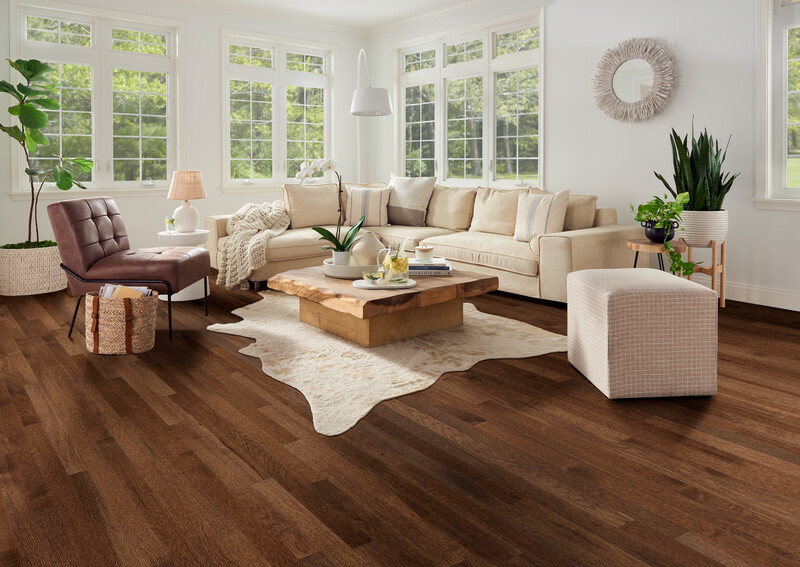
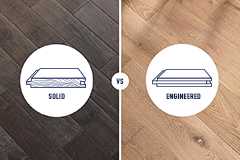 Solid vs Engineered Hardwood Flooring
Solid vs Engineered Hardwood Flooring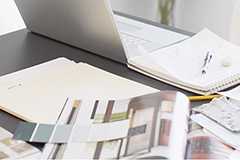 Guide To Choosing a Hardwood Floor
Guide To Choosing a Hardwood Floor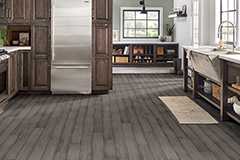 Hardwood Flooring Room Inspiration Guide
Hardwood Flooring Room Inspiration Guide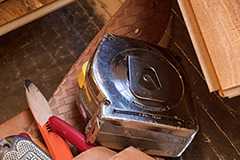 10 Things to Know About Hardwood Floor Installation
10 Things to Know About Hardwood Floor Installation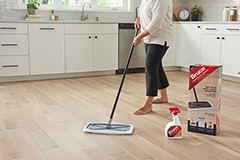 How To Clean and Protect Hardwood Flooring
How To Clean and Protect Hardwood Flooring